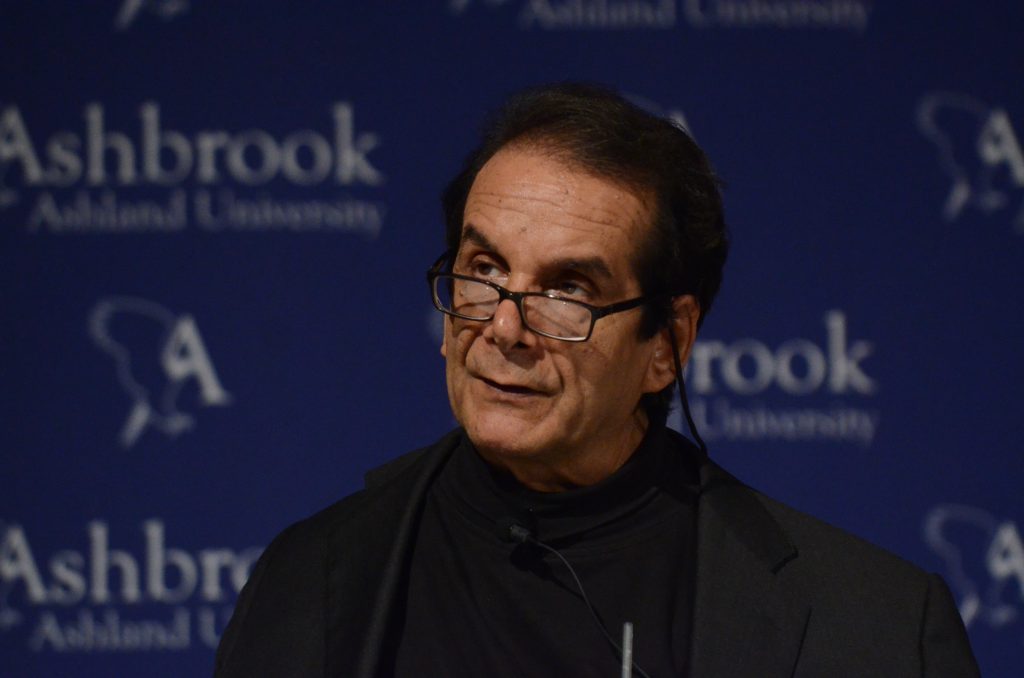Krauthammer Speaks at Ashbrook Memorial Dinner
December 24, 2020

 “We are, have been, and will remain a center-right country,” Washington Post columnist Charles Krauthammer told the crowd of nearly 600 gathered for the 28th Annual John M. Ashbrook Memorial Dinner in Ashland on May 3. Republicans and conservatives will win the coming elections as long as they present the voters’ choice as one determining “the size, scope, and power of government.”
“We are, have been, and will remain a center-right country,” Washington Post columnist Charles Krauthammer told the crowd of nearly 600 gathered for the 28th Annual John M. Ashbrook Memorial Dinner in Ashland on May 3. Republicans and conservatives will win the coming elections as long as they present the voters’ choice as one determining “the size, scope, and power of government.”
Krauthammer applauded Ashbrook, because “teaching the depth of the philosophical issues underlying the uniqueness of the American experiment” is important aspect of the Center’s work.
Krauthammer, who many on both left and right see as America’s most influential news analyst, offered encouragement to conservatives worried about the future of the country after two consecutive presidential losses. To those who argue conservatives should “redo, undo, rethink our principles,” he answered: “Rubbish!”
“Our case is the right case and . . . resonates with the deepest instincts of Americans,” Krauthammer asserted, pointing out that Americans overwhelmingly identify with a moderate or conservative political perspective. Gallup polling shows that in 2012, 38% of voters called themselves conservatives and 36%, moderates. Even exit polls at last November’s elections found that by a margin of eight points, Americans felt government was currently doing too much, not too little.
Krauthammer’s trenchant assessments of national politics frequently brought the crowd to laughter. Analyzing the ideological stance of our current president, Krauthammer distinguished between the usual position of American liberals and the agenda of Obama: “A liberal is someone who doesn’t care what you do as long as it’s mandatory;” Obama, in contrast, “wants to move us more toward the European model of the entitlement state,” a model which history shows to have failed, since much of Europe is “insolvent.”
“The clueless mainstream media were utterly shocked” by Obama’s second inaugural address, Krauthammer said; yet Obama had clearly announced his agenda in his first State of the Union Address, when he declared an intention to transform health care, education, and energy policy. “Think about that. Health care is one sixth of the American economy. Education, you all know, is the future.” Energy, Krauthammer continued, provides “the sinews of the economy,” since it governs how products and services move and at what cost.
Krauthammer explained the two consecutive Democratic presidential wins as consequences of bad timing and a weak candidate field. In 2008, a “war-weary” country voting “six weeks after the worst financial collapse in 70 years” predictably chose the candidate challenging the party in power. In 2012, facing a “totally winnable election,” Republicans failed to muster strong contenders for the nomination.
Romney’s clear grasp of the country’s problems made him “the only plausible candidate” in the field. However, to an electorate still suspicious of Wall Street after the financial collapse, Romney was tainted by his career in finance; and voters disturbed by Obamacare could not forget that Romney as Governor of Massachusetts had introduced the only comparable statewide health care scheme. More fundamentally, “Romney was not fluent in conservatism,” having developed his conservative principles late in his political career.
Republicans will win the next presidential election, Krauthammer asserted, noting that only once in the last 70 years—at the end of Reagan’s successful presidency¾has a party that has held power for two presidential cycles kept it for a third. Moreover, the field of candidates in 2016 will be young, strong, and crowded with energetic and principled leaders. Midterm elections in 2014 should also show a strong conservative rebound, just as occurred in 2010.

